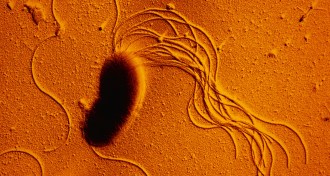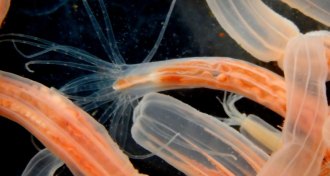All Stories
-
 Life
LifeGenes that control toxin production in C. difficile ID’d
Pinpointing the genes behind Clostridium difficile toxin production could help researchers disarm the superbug without killing “good” bacteria.
-
 Astronomy
AstronomyAstronomers prepare for 2017 solar eclipse spectacle
With one year to go, researchers are making plans for studying both the sun and Earth during the August 2017 total solar eclipse.
-
 Astronomy
AstronomyTabby’s star drama continues
Tabby’s star, already known for its bizarre flicking and fading, dimmed throughout the four years of Kepler’s primary mission.
-
 Life
LifeTwo stationary kinds of bacteria can move when mixed
Bacteria stuck when alone on a dry surface get moving — and get faster — when they evolve together.
By Susan Milius -
 Computing
ComputingSupersmall device uses individual atoms to store data
Scientists manipulate chlorine atoms to store data on a supersmall device.
-
 Health & Medicine
Health & MedicineKeep it simple when choosing a sunscreen for your kid
For parents swimming in a sea of sunscreen choices, look for a few key attributes.
-
 Science & Society
Science & Society‘Idea Makers’ tackles scientific thinkers’ big ideas and personal lives
Stephen Wolfram’s Idea Makers profiles the lives and professional contributions of prominent people in science and technology, including Ada Lovelace, Srinivasa Ramanujan and Steve Jobs.
-
 Life
LifeFor bacteria, assassination can breed cooperation
Cholera bacteria stabbing each other can encourage the evolution of cooperation.
By Susan Milius -
 Life
Life‘Promiscuous’ enzymes can compensate for disabled genes
Promiscuous enzymes can step in when bacteria lose genes they need to function.
-
 Animals
AnimalsCapybaras may be poised to be Florida’s next invasive rodent
Some capybaras have escaped their owners in Florida. Others have been set loose. Now there are fears the giant rodents could become established in the state.
-
 Astronomy
AstronomyDark matter candidate particles are a no-show in Hitomi data
Before the Hitomi satellite broke apart, it captured data that cast further doubt on evidence of X-rays from dark matter particles in a galaxy cluster.
-
 Animals
AnimalsAnemone proteins offer clue to restoring hearing loss
Proteins that sea anemones use to regenerate may help restore damaged hearing in mammals.